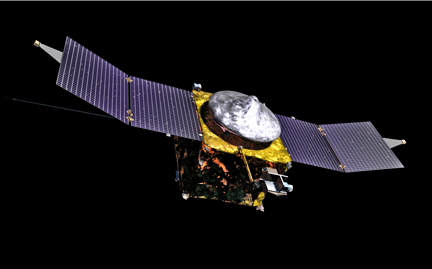
The MAVEN spacecraft, artistic rendition courtesy of Lockheed Martin.
Images of the Martian surface indicate that there was once liquid water present, which would have required a warmer and thicker atmosphere sometime in the past. Carrying three science instrument suites, the MAVEN spacecraft will probe the upper atmosphere of Mars and its interactions with the sun to learn how the Martian atmosphere behaves in the context of solar activity. With this information, scientists will be able to recreate the history of Mars’ atmosphere – what it was once like and what happened to it. The principal investigator for the MAVEN mission is Dr. Bruce Jakosky of the Laboratory for Atmospheric and Space Physics (LASP) at the University of Colorado (CU) at Boulder. Launch of the MAVEN spacecraft is scheduled for November 2013, and arrival and orbit insertion around Mars is scheduled for September 2014. MAVEN is the second mission in the Mars Scout Program which is designed to send small, low-cost, principal investigator-led missions to the Red Planet. The Phoenix Mars Lander was the first Mars Scout mission and was also built and flown by Lockheed Martin for NASA. NASA Goddard will manage the project and will also build some of the instruments for the mission. In addition to the principal investigator coming from CU-LASP, the university will provide science operations, build instruments, and lead education/public outreach. Lockheed Martin of Littleton, Colo., will build the spacecraft based on designs from NASA's Mars Reconnaissance Orbiter and 2001 Mars Odyssey missions and perform mission operations. The University of California-Berkeley Space Sciences Laboratory will also build instruments for the mission. NASA’s Jet Propulsion Laboratory, Pasadena, Calif., will provide navigation support, the Deep Space Network, and the Electra telecommunications relay hardware and operations.

